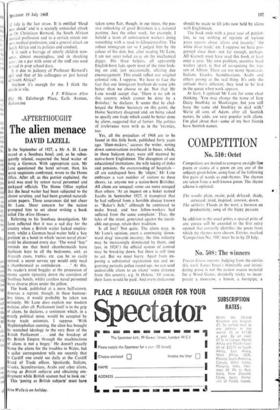The alien menace
.AFTERTHOUGHT DAVID LAZELL
In the September of 1927, a Mr A. H. Lane stayed at a Southsea hotel, and, as he subse- quently related, suspected the head waiter of being a Berman. With appropriate care, Mr Lane .questioned the hotel servant, then, his worst suspicions confirmed, wrote to the Home Office. After all, as this patriot explained, the hotel was used by senior naval personnel and dockyard officials. The Home Office replied that the head waiter had been subjected to the closest scrutiny, and had been granted naturali- sation papers. These assurances did not cheer Mr Lane. Sheer concern for the nation prompted him to set about writing a book called The Alien Menace.
Referring to his Southsea investigation, Mr Lane, reflected that it was a sad day for the country when a British waiter lacked employ- ment, whilst a German head waiter held a 'key position'in a hotel in which 'secret naval plans' could be discussed every day. 'The word "key" reminds me that hotel chambermaids have duplicate keys to all the bedrooms, and, as dispatch cases, trunks, etc, can be so easily opened, a secret service spy would only need a chambermaid as confederate. . . .' At this, the reader's mind boggles at the procession of enemy agents tiptoeing down the corridors of Southsea hotels, whilst careless naval personnel leave diverse plans under the pillow.
The book, published at a mere half-crown, deserves a reprint, though, in these humour- less times, it would probably be taken too seriously. Mr Lane does explain our modern malaise, after all. Parliament itself is in the grip of aliens, he declares, a sentiment which, in a strictly political sense, would be accepted by many trade unionists, " I suppose. 'With Mephistophelian cunning, the alien has brought his wretched ideology to the very floor of the British Parliament . . and the breakup of the British Empire through the machinations of aliens is not a bogey.' He doesn't exactly blame the aliens for the troubles in Wales, but 'a sailor correspondent tells me recently that in Cardiff one could see daily at the Cardiff Board of Trade offices, Spaniards, Italians, Greeks, Scandinavians, Arabs and other aliens, Posing as British subjects and obtaining em- ployment while British seamen bad to look on.' This 'posing as British subjects' must have
John Wells is on holiday.
taken some flair, though, in our times, the pas- sive onlooking of good Britishers is a national pastime. Just the other week, for example, I beheld a team of construction workers doing something with a road in Gloucestershire. The robust immigrant (or so I judged him by the colour of his skin, but, after reading Mr Lane, I am not sure) toiled away on the mechanical digger. His three helpers, all apparently English-born lads, spent most of the time look- ing on and, just occasionally, offering due encouragement. This could reflect our original colonial role, I suppose. We have to face the fact that our immigrant brethren do some jobs better than we choose to do. Not that Mr Lane would accept that. 'There is no job in this country which cannot be done by a Britisher,' he declares. It seems that he chal- lenged the Home Secretary on this point; the Home Secretary disagreed and, on being asked to specify one trade which could be better done by aliens, suggested that of furrier. The politics of irrelevance were with us in the 'twenties, too.
Yes, all the prejudices of 1968 are to be found in this little book, published forty years ago. 'Slum-makers,' accuses the writer, noting down conversations overheard in buses, which, in those halcyon days, were still manned by native-born Englishmen. The disruption of our educational institutions, the wily taking of doles and pensions, the overcrowding of hospitals— all are catalogued here. By 'aliens,' Mr Lane embraces a vast number of visitors to these shores, i.e. anyone not a native-born Britisher. All aliens are unequal, some are more unequal than others. 'At an inquest on a baker named Jacobs in September 1927, it transpired that he had suffered from a horrible disease known as "Baker's Itch," although he continued to make bread, and two fellow-workers had suffered from the same complaint.' Thus, the tales of the street, generated against the inevit- able out-group, retain their tradition.
Is all lost? Not quite. The aliens may, in Mr Lane's opinion, exert a continuing 'down- ward drag' towards insanity; the film industry may be increasingly dominated by them; and (yes, in 1928!) the official system of control may be breaking down, but there is still time to act. But we must hurry. Apart from im- posing a substantial registration tax and or- ganising periodic police round-ups. we can send undesirable aliens to an island 'some distance from this country, e.g. St Helena.' Of course, their fares would be paid. And every endeavour should be made to fill jobs now held by aliens with Englishmen.
The book ends with a great roar of patriot- ism, to say nothing of reprints of various press teports about 'aliens and insanity,' the white slave trade,' etc. I suppose we have pro- gressed since then—not far enough, perhaps. Alf Garnett must have read this book at least once a year. My own problem, secretive head waiters apart, is that of recognising the true son of Albion. There are too many Spaniards. Italians, Greeks, Scandinavians, Arabs and others posing as the real thing. It's only the attitude that's different; they tend to be first in the queue when work appears.
At least, I applaud Mr Lane for some clear thinking. 'You may change the name of Izzy Dizzy Imoffsky to MacGregor, but you still have the same old Imoffsky to deal with.' We're all sons of Adam, after all. Scottish names, he adds, are very popular with aliens. I'm glad about that—some of my best friends have Scottish names.






































 Previous page
Previous page